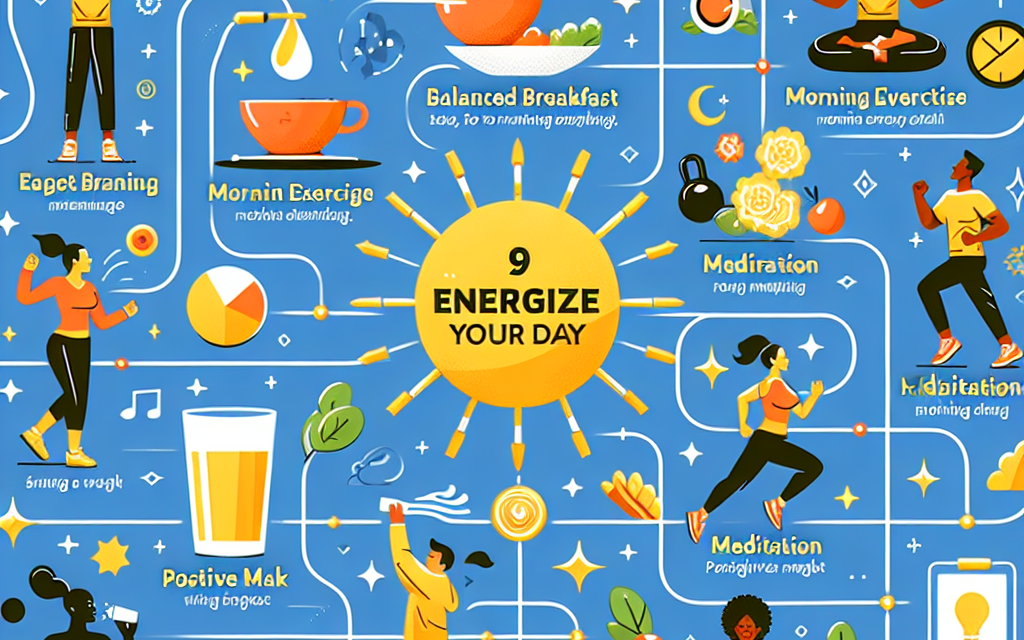9 Effective Strategies to Energize Your Day
In our fast-paced world, feeling energized and motivated can sometimes seem like an uphill battle. Whether it’s the morning slump, the post-lunch dip, or the evening fatigue, many of us struggle to maintain our energy levels throughout the day. However, with the right strategies, you can boost your energy, enhance your productivity, and improve your overall well-being. This article explores nine effective strategies to energize your day, each supported by research and practical examples.
1. Start Your Day with a Morning Routine
A well-structured morning routine can set a positive tone for the rest of your day. Research shows that individuals who have a consistent morning routine report higher levels of productivity and lower stress levels. Here are some key components to consider when crafting your morning routine:
- Wake Up Early: Waking up early gives you a head start on the day. Studies suggest that early risers tend to be more proactive and have better mental health.
- Hydrate: After several hours of sleep, your body is dehydrated. Drinking a glass of water first thing in the morning can kickstart your metabolism and improve cognitive function.
- Exercise: Engaging in physical activity, even if it’s just a short walk or some stretching, can release endorphins and boost your energy levels.
- Mindfulness or Meditation: Taking a few minutes to meditate or practice mindfulness can help clear your mind and reduce anxiety, allowing you to approach the day with a positive mindset.
- Healthy Breakfast: A nutritious breakfast fuels your body and brain. Foods rich in protein and complex carbohydrates can provide sustained energy throughout the morning.
For example, a study published in the journal “Health Psychology” found that individuals who engaged in a morning routine that included physical activity and mindfulness reported higher energy levels and better mood throughout the day. By establishing a morning routine that works for you, you can create a solid foundation for a productive day.
2. Incorporate Physical Activity Throughout the Day
Physical activity is one of the most effective ways to boost your energy levels. Regular exercise increases blood flow, enhances mood, and improves overall health. Here are some strategies to incorporate physical activity into your daily routine:
- Take Short Breaks: Instead of sitting for long periods, take short breaks every hour to stand up, stretch, or walk around. This can help reduce fatigue and improve focus.
- Use the Stairs: Opt for stairs instead of elevators whenever possible. Climbing stairs is a quick way to get your heart rate up and energize your body.
- Walk or Bike to Work: If feasible, consider walking or biking to work. This not only provides exercise but also helps clear your mind before starting your workday.
- Join a Class: Participating in group fitness classes can be motivating and fun. Whether it’s yoga, dance, or martial arts, find an activity that you enjoy.
- Set a Daily Step Goal: Use a pedometer or smartphone app to track your steps. Aim for at least 10,000 steps a day to keep your body active.
A study published in the “Journal of Clinical Psychology” found that individuals who engaged in regular physical activity reported higher energy levels and lower levels of fatigue. By incorporating movement into your day, you can combat lethargy and enhance your overall well-being.
3. Optimize Your Nutrition
Your diet plays a crucial role in your energy levels. Consuming the right foods can help sustain your energy throughout the day. Here are some nutritional strategies to consider:
- Eat Balanced Meals: Focus on meals that include a balance of protein, healthy fats, and complex carbohydrates. This combination provides sustained energy and prevents blood sugar spikes and crashes.
- Snack Wisely: Choose healthy snacks such as nuts, fruits, or yogurt to keep your energy levels stable between meals. Avoid sugary snacks that can lead to energy crashes.
- Stay Hydrated: Dehydration can lead to fatigue. Aim to drink at least eight glasses of water a day, and consider herbal teas or infused water for variety.
- Limit Caffeine: While caffeine can provide a temporary energy boost, excessive consumption can lead to jitters and crashes. Limit your intake and consider alternatives like green tea.
- Plan Your Meals: Meal prepping can help you make healthier choices and avoid the temptation of fast food. Plan your meals for the week to ensure you have nutritious options available.
Research from the “American Journal of Clinical Nutrition” indicates that a diet rich in whole foods, including fruits, vegetables, whole grains, and lean proteins, is associated with higher energy levels and better overall health. By optimizing your nutrition, you can fuel your body for sustained energy throughout the day.
4. Manage Stress Effectively
Chronic stress can drain your energy and negatively impact your health. Learning to manage stress effectively is essential for maintaining high energy levels. Here are some strategies to consider:
- Practice Mindfulness: Mindfulness techniques, such as meditation and deep breathing exercises, can help reduce stress and improve focus. Even a few minutes a day can make a difference.
- Prioritize Sleep: Lack of sleep can exacerbate stress and lead to fatigue. Aim for 7-9 hours of quality sleep each night to recharge your body and mind.
- Set Boundaries: Learn to say no to commitments that overwhelm you. Setting boundaries can help you manage your time and reduce stress levels.
- Engage in Hobbies: Make time for activities you enjoy. Engaging in hobbies can provide a mental break and help you recharge.
- Seek Support: Don’t hesitate to reach out to friends, family, or professionals for support. Talking about your stressors can provide relief and new perspectives.
A study published in the “Journal of Occupational Health Psychology” found that individuals who practiced stress management techniques reported higher energy levels and lower fatigue. By managing stress effectively, you can preserve your energy and improve your overall quality of life.
5. Create a Productive Work Environment
Your work environment can significantly impact your energy levels and productivity. A well-organized and inspiring workspace can help you stay focused and energized. Here are some tips for creating a productive work environment:
- Declutter Your Space: A cluttered workspace can lead to distractions and decreased productivity. Take time to organize your desk and remove unnecessary items.
- Incorporate Natural Light: Exposure to natural light can improve mood and energy levels. If possible, position your workspace near a window or use full-spectrum lighting.
- Personalize Your Space: Adding personal touches, such as photos or plants, can make your workspace more inviting and energizing.
- Use Ergonomic Furniture: Investing in ergonomic chairs and desks can improve comfort and reduce fatigue during long work hours.
- Limit Distractions: Identify and minimize distractions in your workspace. This may include turning off notifications on your phone or using noise-canceling headphones.
Research from the “Journal of Environmental Psychology” indicates that a well-designed workspace can enhance productivity and energy levels. By creating a productive work environment, you can stay focused and energized throughout the day.
6. Take Regular Breaks
Taking regular breaks is essential for maintaining energy levels and preventing burnout. Research shows that short breaks can enhance focus and productivity. Here are some strategies for effective break-taking:
- Use the Pomodoro Technique: This time management method involves working for 25 minutes and then taking a 5-minute break. After four cycles, take a longer break of 15-30 minutes.
- Change Your Scenery: Step outside or move to a different room during your breaks. A change of environment can refresh your mind and boost creativity.
- Engage in Relaxation Techniques: Use your breaks to practice relaxation techniques, such as deep breathing or stretching, to reduce tension and recharge.
- Connect with Others: Use breaks to socialize with colleagues or friends. Positive social interactions can improve mood and energy levels.
- Limit Screen Time: During breaks, try to step away from screens. Engaging in non-screen activities can help reduce eye strain and mental fatigue.
A study published in the “Journal of Applied Psychology” found that employees who took regular breaks reported higher energy levels and improved job satisfaction. By incorporating regular breaks into your routine, you can enhance your focus and productivity.
7. Stay Connected with Nature
Spending time in nature has been shown to have numerous benefits for mental and physical health. Nature can be a powerful energizer. Here are some ways to connect with nature:
- Take Walks in Nature: If possible, take your breaks or exercise routines outdoors. Walking in a park or natural setting can boost your mood and energy levels.
- Practice Gardening: Gardening is a great way to connect with nature while also getting physical activity. It can be therapeutic and energizing.
- Bring Nature Indoors: Incorporate plants into your workspace or home. Studies show that indoor plants can improve air quality and enhance mood.
- Plan Outdoor Activities: Schedule regular outdoor activities, such as hiking, biking, or picnicking, to enjoy the benefits of nature.
- Mindfulness in Nature: Practice mindfulness while in nature by focusing on the sights, sounds, and smells around you. This can enhance relaxation and energy levels.
Research from the “International Journal of Environmental Research and Public Health” indicates that spending time in nature can reduce stress, improve mood, and increase energy levels. By staying connected with nature, you can enhance your overall well-being and vitality.
8. Foster Positive Relationships
Social connections play a vital role in our energy levels and overall happiness. Positive relationships can provide support, encouragement, and motivation. Here are some strategies to foster positive relationships:
- Make Time for Friends and Family: Prioritize spending time with loved ones. Engaging in meaningful conversations and activities can boost your mood and energy.
- Join Social Groups: Consider joining clubs or groups that align with your interests. This can help you meet new people and build supportive relationships.
- Practice Gratitude: Expressing gratitude towards others can strengthen relationships and enhance your own well-being. Take time to acknowledge the positive impact others have on your life.
- Be Supportive: Offer support to friends and family when they need it. Building a network of mutual support can enhance your energy and resilience.
- Limit Toxic Relationships: Identify and distance yourself from relationships that drain your energy. Surround yourself with positive, uplifting individuals.
A study published in the “Journal of Happiness Studies” found that individuals with strong social connections reported higher energy levels and overall life satisfaction. By fostering positive relationships, you can enhance your emotional well-being and vitality.
9. Set Goals and Stay Motivated
Setting goals can provide direction and motivation, helping you stay energized throughout the day. Here are some strategies for effective goal-setting:
- Set SMART Goals: Ensure your goals are Specific, Measurable, Achievable, Relevant, and Time-bound. This framework can help you create clear and attainable objectives.
- Break Goals into Smaller Tasks: Divide larger goals into smaller, manageable tasks. This can make them feel less overwhelming and help you maintain momentum.
- Track Your Progress: Keep a journal or use apps to track your progress towards your goals. Celebrating small achievements can boost motivation and energy.
- Visualize Success: Spend time visualizing the successful completion of your goals. This can enhance motivation and reinforce your commitment.
- Stay Flexible: Be open to adjusting your goals as needed. Flexibility can help you stay motivated and energized, even when faced with challenges.
Research from the “American Psychological Association” indicates that individuals who set and pursue goals report higher levels of motivation and energy. By setting clear goals and staying motivated, you can enhance your productivity and overall well-being.
Conclusion
Energizing your day requires a multifaceted approach that encompasses physical, mental, and emotional well-being. By implementing these nine effective strategies—establishing a morning routine, incorporating physical activity, optimizing nutrition, managing stress, creating a productive work environment, taking regular breaks, connecting with nature, fostering positive relationships, and setting goals—you can significantly enhance your energy levels and overall quality of life.
Remember that small changes can lead to significant improvements. Start by incorporating one or two strategies into your daily routine and gradually build from there. With commitment and consistency, you can transform your days from sluggish to energized, allowing you to thrive in both your personal and professional life.





